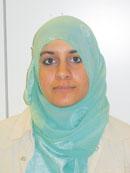Why is it, if I speak up in classes, that people perceive me as the voice of religion or of conservatism? Of course, to me, that’s perfectly fine, but on the other hand, to the rest of my classmates, there’s a negative stigma attached to my opinions. This comes not only from what I say, but from how I look; my hijab makes them assume right away that I must be conservative or very religious- and from my (so-called) traditional opinions as well. People already have negative images and stereotypes about Muslims before I speak. This negativity motivates me to speak even more, to show the reality of how Muslim Americans think as well as show the religious perspective isn’t bad, it’s just another way to look at things.
What is the main issue I have at hand with this daily academic scenario? The religious perspective is looked down upon in academia as though it is inferior to secularism and science, as though they cannot work hand in hand.
Ironically, in the American society we can all attest to how religion is coming more and more to the forefront.
Theoretically, there is supposed to be a separation of church and state. Yet, even though our founding fathers had this idea in mind, they too had religious undertones in their works. Currently, we can see religion in the vanguard of American politics with George W. Bush and the Evangelical movement. Americans cannot deny religion is still an important part of society. Even so, in the academic setting it is still hard for many students to feel confident to speak up, share opinions and perspectives, or just feel welcomed in general. This connects to the idea of America being a diverse melting pot of ethnicities.
No longer are there just Caucasian Americans as the majority. There are various peoples from all over the world, especially here at UMass Boston: Asian, South American, Middle Eastern, Native American, African, Hispanic, Pacific Islanders, Caribbean. Let’s not forget, besides ethnicities there are unquestionably a variety of religions that students adhere to. Yet, depending on the academic setting many non-Caucasian students do feel unwelcome. This is an issue that should be addressed at UMass Boston. My personality is quite straight forward and outspoken so even if I felt unwelcome you would still hear me speak up. But there are many students who have told me they have plenty they want to say but don’t feel comfortable doing so. We need as a student body to assess this situation – no matter the race, ethnicity, religion; we need to let people feel equal in our classrooms so that they can ultimately feel welcome in the real world settings.

